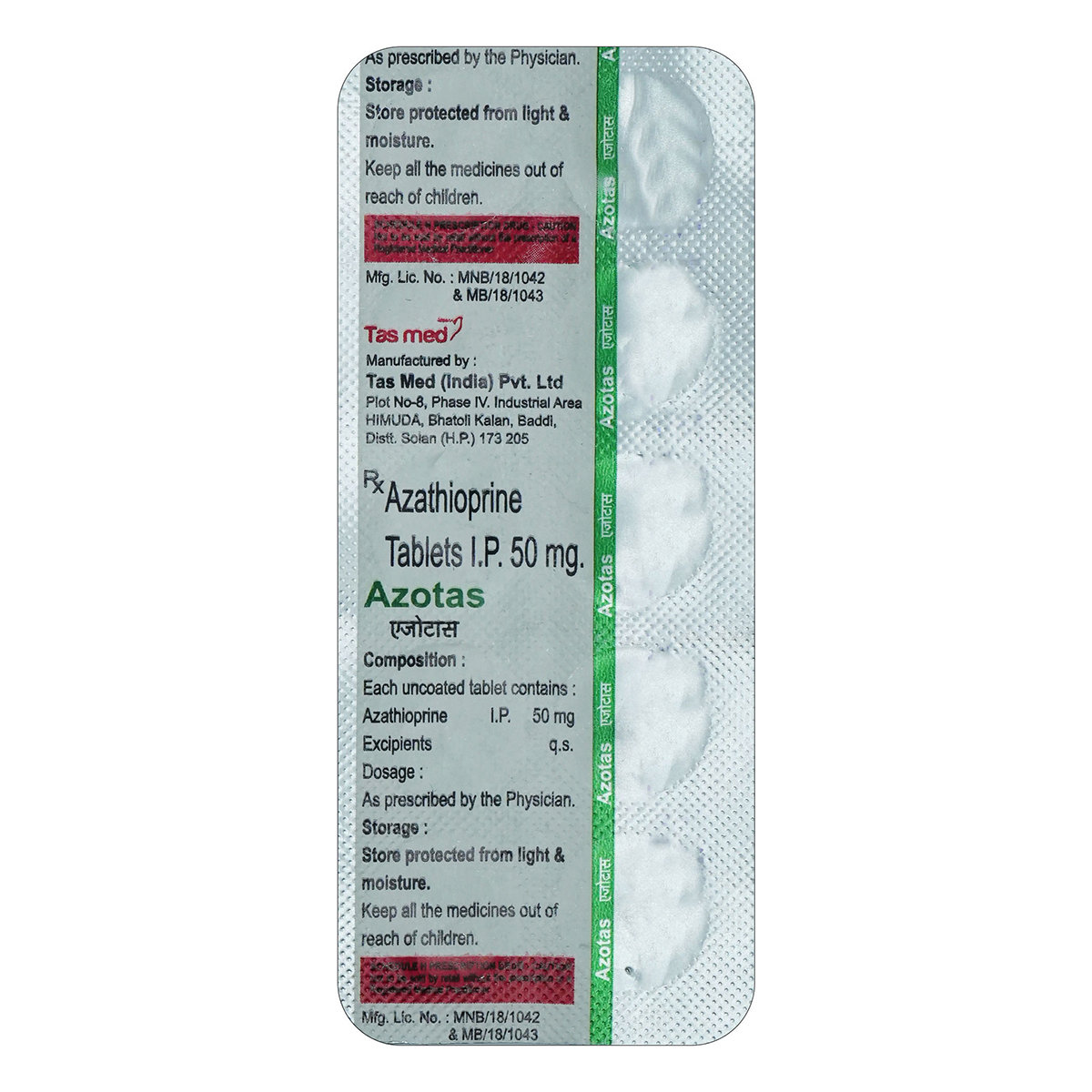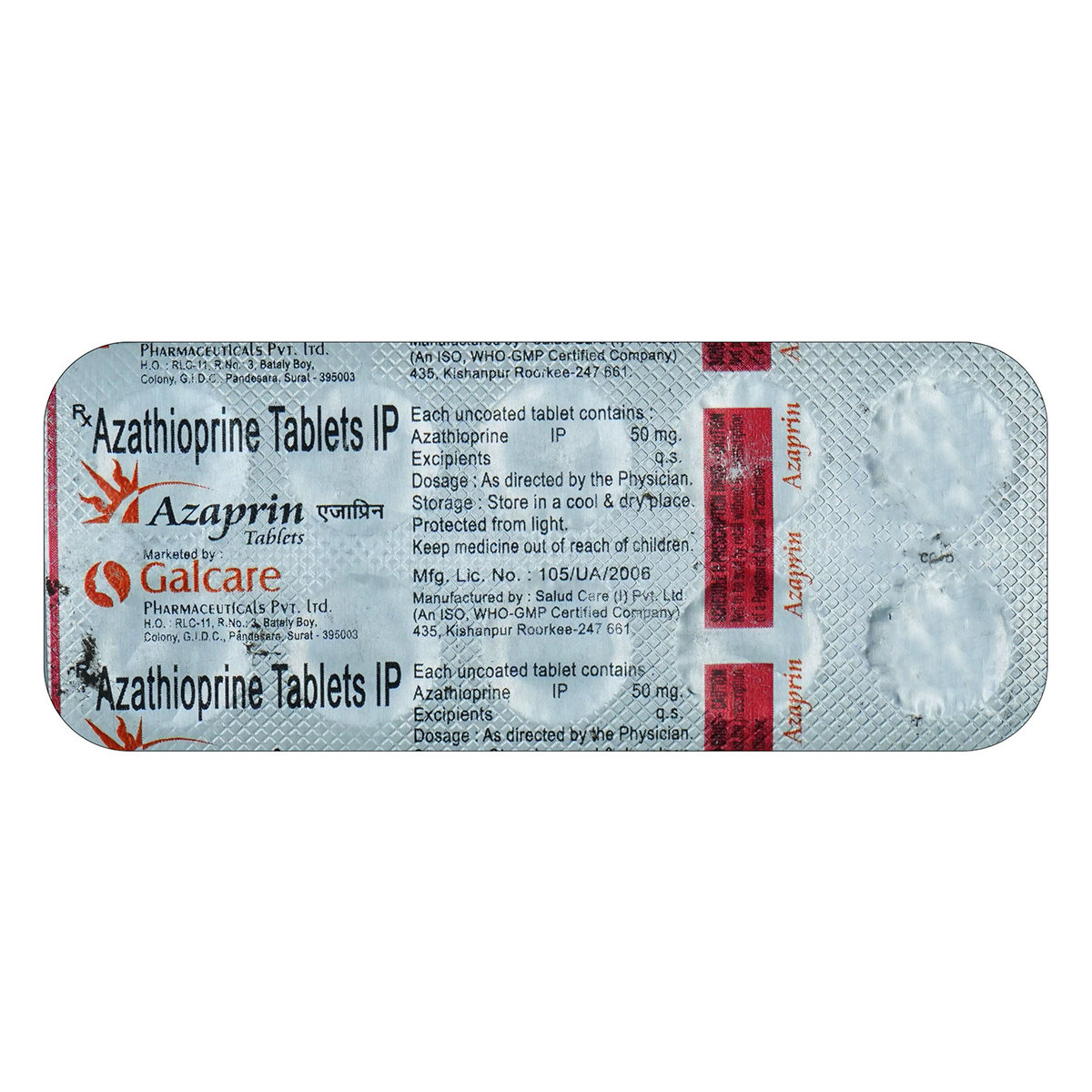- Home
- Imoprine Tablet
Imoprine Tablet Substitute
Imoprine Tablet Substitute
Medicine Composition:
AZATHIOPRINE-50MGAll Substitutes & Brand Comparisons
RX
Immugen 50 Tablet 10's
Newgen Life Sciences Pvt Ltd
₹11
(₹0.99 per unit)
90% CHEAPERRX
Azoran 50 mg Tablet 10's
RPG Life Sciences Ltd
₹104
(₹9.36 per unit)
8% CHEAPERRX
Aparin Tablet 10's
Race Pharmaceuticals Pvt Ltd
₹106.5
(₹9.59 per unit)
6% CHEAPERRX
Out of StockAzothrone-50 Tablet 10's
Johnlee Pharmaceuticals Pvt Ltd
₹111.1
(₹10.0 per unit)
2% CHEAPERRX
Zymurine Tablet 10's
Cadila Healthcare Ltd
₹115.5
(₹10.16 per unit)
1% CHEAPERRX
Azotas 50 mg Tablet 10's
Tas Med India Pvt Ltd
₹116.5
(₹10.49 per unit)
2% COSTLIERRX
ATZ 50 Tablet 15's
Intas Pharmaceuticals Ltd
₹180
(₹10.56 per unit)
2% COSTLIERRX
Innomune Tablet 10's
Cipla Ltd
₹118
(₹10.62 per unit)
3% COSTLIERRX
Aretha Tablet 10's
Biocon Ltd
₹118
(₹10.62 per unit)
3% COSTLIERRX
Azarid 50 Tablet 10's
East West Pharma India Pvt Ltd
₹118
(₹10.62 per unit)
3% COSTLIERRX
Azaprin Tablet 10's
Cadila Healthcare Ltd
₹119
(₹10.71 per unit)
4% COSTLIERRX
Azoran 50 mg Tablet 20's
RPG Life Sciences Ltd
₹240
(₹10.8 per unit)
5% COSTLIERRX
AZR Tablet 10's
Ipca Laboratories Ltd
₹120
(₹10.8 per unit)
5% COSTLIERRX
Azapure 50mg Tablet 10's
Intas Pharmaceuticals Ltd
₹120
(₹10.8 per unit)
5% COSTLIERRX
Out of StockAzoalfa-50 Tablet 10's
Alniche Life Sciences Pvt Ltd
₹125.57
(₹11.3 per unit)
10% COSTLIER

When Should You Consider Switching from Imoprine Tablet ?
Patients may explore substitutes in the following scenarios:
- High monthly cost of Imoprine Tablet
- Non-availability in local pharmacies
- Generic recommendation by a doctor
- Side effects or better tolerability with alternatives
What to Know Before Switching
Before you switch from Imoprine Tablet to another medicine, here are some important points to keep in mind:
Same salt, different brands:
Most substitutes contain the same active ingredient - AZATHIOPRINE-50MG, but the fillers, coating, or manufacturing quality may vary slightly.
Consult your doctor first:
Even if the salt is the same, your doctor can confirm if the substitute is right for your condition, dosage, and health history.
Watch out for allergies or reactions:
Some people may react differently to certain brands due to inactive ingredients. If you notice any side effects, inform your doctor immediately.
Price ≠ effectiveness:
A lower-priced substitute doesn't mean it's less effective. Many generic medicines work just as well as branded ones.
Check the dosage form and strength:
Always match the substitute’s strength (e.g., 5mg, 10mg) and form (tablet, capsule, syrup) with what your doctor prescribed.
Uses
Imoprine Tablet is used to manage autoimmune and inflammatory conditions by suppressing the immune system. The detailed uses of Imoprine Tablet are as follows:
- Rheumatoid arthritis: Imoprine Tablet reduces joint pain, swelling, and stiffness in individuals with active rheumatoid arthritis.
- Autoimmune hepatitis: Imoprine Tablet helps to manage liver inflammation caused by the immune system.
- Prevention of kidney transplant rejection: Imoprine Tablet suppresses immunological activity, preventing the body from rejecting a transplanted kidney.
- Systemic lupus erythematosus:Imoprine Tablet treats symptoms that affect the skin, joints, and internal organs.
- Blood disorders: Imoprine Tablet treats thrombocytopenia and hemolytic anemia.
- Autoimmune skin and muscle diseases: Imoprine Tablet treats pemphigus and dermatomyositis by reducing skin blisters, sores, and muscle inflammation.
- Vasculitis: Imoprine Tablet treats blood vessel inflammation in conditions such as polyarteritis nodosa.
Medicinal Benefits
- Imoprine Tablet helps to reduce the pain/inflammation in rheumatoid arthritis conditions and keep the immune system from attacking new transplant organs like kidneys.
- Imoprine Tablet is also used to treat severe inflammatory diseases of the skin, Crohn's disease, ulcerative colitis, and some blood disorders.
- Imoprine Tablet contains 'Azathioprine', which is an immunosuppressant that works by reducing the function of the cells and causing inflammation in the joint tissues. It reduces pain and inflammation and slows joint damage and disease progression over time.
- Besides this, after an organ transplant, your body will try to attack the new organ as it sees it as foreign. Imoprine Tablet helps stop your body from rejecting a new organ by suppressing your immune system.
FAQs
The substitutes of Imoprine Tablet contain the same active salt(s) - AZATHIOPRINE-50MG. However, they may differ in price, manufacturing quality, and inactive ingredients. Speak to your doctor to find a suitable option.
Switching to a generic substitute medicine in the place of Imoprine Tablet is often possible if it has the same salt, strength, and dosage form. But always check with your doctor before making any changes to your medication.
Generics versions of Imoprine Tablet are typically more affordable because they don’t include the original brand's research, development, and marketing costs. They contain the same active ingredient and are approved for safety and effectiveness.
Most people don’t notice any difference. However, some may react to different fillers or coatings. If you notice any unusual symptoms after switching, consult your doctor.
Make sure the new medicine has the same active salt, strength, dosage form. Always confirm the change with your doctor or pharmacist.
Substitutes of Imoprine Tablet meet the same safety and efficacy standards as Imoprine Tablet , but small differences in absorption or formulation can exist. A doctor can help you choose the right one for your needs.
Yes. Substitutes of Imoprine Tablet may vary in color, size, or shape due to differences in manufacturing and branding, but this does not affect how they work.
Yes, it’s generally safe to switch between multiple substitutes of Imoprine Tablet if they have the same salt and strength. However, always inform your doctor so they can monitor how your body responds.
Yes, many people safely use substitutes of Imoprine Tablet for long-term treatment. Just ensure it’s done under medical supervision.
If your symptoms stay under control or lab results remain stable, the substitute for Imoprine Tablet is likely working well. Regular follow-ups with your doctor are important.
Absolutely. Even with the same salt, small differences can affect how your body responds when switching from Imoprine Tablet to its substitute. Always consult your doctor before switching.
Imoprine Tablet is used in treating Rheumatoid arthritis and immunosuppressant therapy after kidney transplant.
Imoprine Tablet causes leukopenia (decreased number of white blood cells) and hence may make you more susceptible to infections. Consult your doctor if you develop any signs of infections such as fever, sore throat, breathlessness, jaundice, unexplained bleeding, or bruising.
Imoprine Tablet acts as an immunosuppressant, which helps in reducing inflammation and prevents joint stiffness, thereby provides relief from rheumatoid arthritis.
If you miss a dose of Imoprine Tablet , take the missed dose as soon as you remember it. However, if it's almost time for the next dose, do not take a double dose to make up for a missed one.
Diarrhea might be a side-effect of Imoprine Tablet . Drink lots of fluids and eat food rich in fiber if you experience diarrhea. If you find blood in stools (tarry stools) or if you experience excess diarrhea consult your doctor. Do not take anti-diarrheal medicine on your own.
Imoprine Tablet is a Category D pregnancy drug that is not recommended for pregnant women or given only when strictly guidance of the doctor as there is no clinical data available on use in pregnant women.
Imoprine Tablet starts to work gradually. it can take up to 12 weeks of taking the right adjusted dose before you notice any benefits.
If you miss a prescription dose, take it as soon as you recall and resume your regular routine. If you are near the next dose, skip the missing dose and resume your regular schedule. Do not take a double dose to make up for a forgotten dose.
It depends on your individual medical condition and response to the medication. Your doctor will determine the appropriate duration of treatment based on your specific needs.
Taking Imoprine Tablet for a long time can increase your risk of developing some types of cancer, including skin cancer. As a result, avoid direct sunlight, apply sunscreen (SPF 30 or higher), and wear in clothes that shield your arms and legs.
You'll have regular blood tests while taking azathioprine. These tests will ensure that any concerns or problems are found quickly.
Imoprine Tablet may have an effect on your liver, kidneys, or bone marrow. Before you begin taking this medication, you will undergo blood tests to assess your liver function, renal function, and blood count. From week one to week eight of your treatment, you will undergo at least one blood test every week.
Yes, taking Imoprine Tablet for a long time can increase your risk of developing some types of cancer, including skin cancer. Seek medical attention if you experience any changes in your body.
Using Cyclosporine together with Imoprine Tablet may decrease the effects of cyclosporine. Caution is advised if Cyclosporine must be taken with Imoprine Tablet . You may need a dose adjustment or special test if you use both medications.
Alcohol does not affect the way azathioprine works. However, both azathioprine and alcohol can affect your liver. For this reason, limit or avoid the consumption of alcohol is recommended.
Common side effects of Imoprine Tablet may include nausea, headaches, vomiting, diarrhoea, unusual fatigue, dizziness, headache, loss of appetite, increase in liver enzymes, lowered resistance to infections, tingling sensation, stomach pain, leukopenia (decreased number of white blood cells), and sore throat. Most of these side effects do not require medical attention and will resolve gradually over time. However, you are advised to talk to your doctor if you experience these side effects persistently.
Buy best Immuno Modulators products by
Intas Pharmaceuticals Ltd
Ipca Laboratories Ltd
Hetero Healthcare Pvt Ltd
Cipla Ltd
Emcure Pharmaceuticals Ltd
Panacea Biotec Ltd
Sun Pharmaceutical Industries Ltd
Biocon Ltd
RPG Life Sciences Ltd
Overseas Health Care Pvt Ltd
Natco Pharma Ltd
Zydus Healthcare Ltd
Alkem Laboratories Ltd
Bharat Serums and Vaccines Ltd
Reliance Formulation Pvt Ltd
Zydus Cadila
Abbott India Ltd
Alembic Pharmaceuticals Ltd
Msn Laboratories Pvt Ltd
Novartis India Ltd
Prevego Healthcare & Research Pvt Ltd
Cadila Healthcare Ltd
La Renon Healthcare Pvt Ltd
Wallace Pharmaceuticals Pvt Ltd
Concord Biotech Ltd
Knoll Healthcare Pvt Ltd
Mylan Pharmaceuticals Pvt Ltd
Torrent Pharmaceuticals Ltd
Ankaa Pharmaceutical
Brinton Pharmaceuticals Ltd
Canixa Life Sciences Pvt Ltd
Hospimax Healthcare Pvt Ltd
Tas Med India Pvt Ltd
Anthem Bio Pharma
CONCORD DRUGS LTD
EVERVITAL LIFESCIENCES
Lupin Ltd
Merynova Life Sciences India Pvt Ltd
Micro Labs Ltd
Steadfast MediShield Pvt Ltd
Steris Healthcare
Vasu Organics Pvt Ltd
Wockhardt Ltd
Ajanta Pharma Ltd
Aubade Healthcare Pvt Ltd
Eris Life Sciences Ltd
Glenmark Pharmaceuticals Ltd
Hetero Drugs Ltd
Indiabulls Pharmaceuticals Pvt Ltd
Mankind Pharma Pvt Ltd
Medgenix Pharma India Pvt Ltd
Tesla Labs
United Biotech Pvt Ltd
Akognos Life Science Pvt Ltd
Alniche Life Sciences Pvt Ltd
Biokindle Lifesciences Pvt Ltd
Biotest Pharma Gmbh
Calren Care Lifesciences Pvt Ltd
Care Formulations Lab
Celera Pharma Pvt Ltd
Celon Laboratories Pvt Ltd
Cognitus Life Sciences Pvt Ltd
Concord Laboratories Pvt Ltd
East West Pharma India Pvt Ltd
Mediart Life Sciences Pvt Ltd
Neuten HealthCare
Pfizer Ltd
Rene Lifescience
Skinocean Pharmaceuticals
Advaith Life Sciences Pvt Ltd
Alacris Healthcare Pvt Ltd
Arcalis India Pharmaceuticals Pvt Ltd
Astellas Pharma India Pvt Ltd
Bharat Sanchar Nigam Ltd
Biochem Pharmaceutical Industries Ltd
Bioswizz Pharmaceuticals Ltd
Cadila Pharmaceuticals Ltd
Celera Healthcare Pvt Ltd
Cyrus Remedies Pvt Ltd
Dr Reddy's Laboratories Ltd
Elera Pharma Ltd
Eli Lilly and Company (India) Pvt Ltd
Immune Biotech Pvt Ltd
Koye Pharmaceuticals Pvt Ltd
Medieos Life Sciences Llp
Nexicon Pharmaceuticals
Olcare Laboratories Pvt Ltd
Oxygen Pharma Care Pvt Ltd
Plasmagen Biosciences Pvt Ltd
Ponoogun Healthcare Pvt Ltd
Rebanta Healthcare Pvt Ltd
Rhumasafe Pharma
Rivan Pharmaceuticals Pvt Ltd
Rockmed Pharma Pvt Ltd
Sai Mirra Innopharma Pvt Ltd
Septalyst Lifesciences Pvt Ltd
The Madras Pharmaceuticals
Aareen Healthcare Pvt Ltd
Actus Health Care
Adley & Bdl













